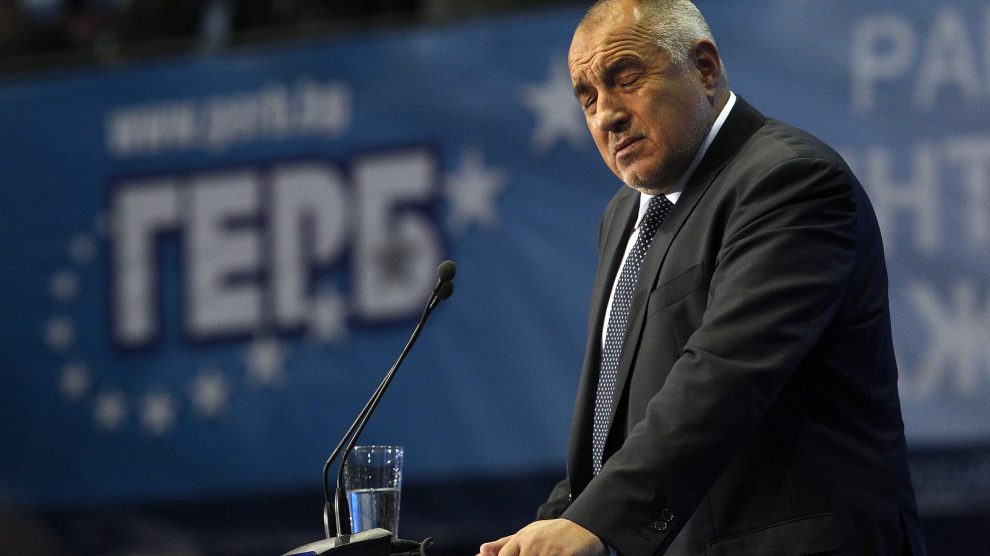Bulgaria’s former prime minister, Boyko Borissov, has been courting Macedonians with Bulgarian passports, but his party could be heading for defeat in July 11’s parliamentary election.
A snap parliamentary election in Bulgaria on July 11 looks set to be a close-run contest, but may be just as inconclusive as the previous vote, held in April.
- Has North Macedonia’s PM backed the wrong side in Bulgaria’s election?
- Bulgarians look to Romania’s Kövesi to fight high-level corruption
- On the Balkans, Biden is stuck in the 2000s
As in April, the fight for first place is between the former ruling GERB party of former prime minister Boyko Borissov and a new, populist, anti-establishment party known as There Is Such A People (ITN).
In poll of polls put together by Politico, GERB is forecast to get 22 per cent of the vote, a slender lead of just one per cent over ITN. In one poll, however, published by Gallup International, ITN has a miniscule lead of GERB: 21.2 per cent to 21 per cent.
What looks certain is that GERB’s share of the vote will be well below the 26.2 per cent in won in April, while ITN, which took 17.7 per cent, will fare considerably better.
The drop in voter trust towards GERB since the April election has come as a result of a series of revelations of corruption by GERB party members brought to light by the current caretaker government.
However, the former ruling party does not appear to have given up on the hope of returning to office, and has campaigned on a promise to return stability to the country.
Last month, GERB leader Borissov met in Sofia with North Macedonian PM Zoran Zaev, where the two politicians discussed Bulgaria’s ongoing veto of North Macedonia’s EU accession talks.
Courting the diaspora
Some analysts have interpreted Borissov’s most recent promise to Zaev – to improve relations between the two countries and potentially lift the veto – as a last, desperate attempt to improve his party’s crumbling international image.
However, it can also be viewed as an attempt to appeal to a rather niche and usually overlooked part of the Bulgarian electorate – Macedonians with a Bulgarian passport.
As many as 77,000 Macedonians are believed to hold dual citizenship and at least 30,000 more are said to be eligible.
The process of acquiring Bulgarian documents is rather easy for Macedonians and a number of other Slavic groups in the Western Balkans and Turkey, as they are often given a Bulgarian nationality based on “origin” rather than naturalisation.
However, of those Macedonians with a Bulgarian passport only around 500 are said to have voted in the April 4 election.
Last week, Bulgaria’s interim interior minister, Boyko Rashkov, suggested that GERB’s attempts to get Macedonians to vote was problematic.
Rashkov accused former GERB interior minister Hristo Terziiski of participating in a meeting at a town near the border with North Macedonia where he allegedly agreed to pay for 15,000 Macedonians with Bulgarian passports to participate in the election.
This relatively small number of votes could nevertheless be enough to gain an extra seat or two in parliament: not an inconsequential number in a race so tight.
Stalemate to continue?
On July 3 Borissov also held an informal meeting with Turkish President Recep Tayyip Erdoğan, who referred to Borissov as his “best friend” and wished him good luck in the upcoming elections.
However, a spokesperson for GERB claimed that Borissov and other party representatives travelled to Istanbul in order to monitor potential electoral fraud: “We cannot allow the Movement for Democratic Freedoms (DPS) party to control the vote of the [Bulgarian-Turkish] diaspora and for these people to be monopolised by one party. Borissov is in Turkey in order to meet with diaspora organisations.”
The DPS, which draws its support primarily from Bulgaria’s Muslim minority, is often the kingmaker in Bulgarian politics, usually taking around 10 per cent of the vote.
Meanwhile, accusations of fraud on the campaign trail have increased by 400 per cent compared to the campaign for the April elections, with Rashkov accusing the former government of knowingly closing its eyes to large-scale election fraud.
“Two former interior ministers, Hristo Terziiski and Mladen Marinov, are currently MP candidates for GERB. This is perhaps one of the explanations for the fact that during the previous parliamentary elections on April 4 there were no registered cases of vote-buying in favour of GERB, and, in general, the number of prosecutions made for such crimes during the last election can be counted on the fingers of one hand,” said Rashkov in an interview on July 7.
ITN leader and TV host Slavi Trifonov revealed last week the that he will not try to become prime minister of the country even if his party wins the election, and that ITN will instead pick someone with experience in politics.
Trifonov, who very much remains the public face of the party, also confirmed that ITN will attempt to form a coalition with Democratic Bulgaria and the anti-corruption Stand Up! Mafia Out! party, which are both predicted to see an increase in their vote share – from 9.5 to 12 per cent, and from 4.7 to six per cent of the vote, respectively.
If the three parties are unable to do so, the current stalemate could continue for some time.
Unlike many news and information platforms, Emerging Europe is free to read, and always will be. There is no paywall here. We are independent, not affiliated with nor representing any political party or business organisation. We want the very best for emerging Europe, nothing more, nothing less. Your support will help us continue to spread the word about this amazing region.
You can contribute here. Thank you.




Add Comment